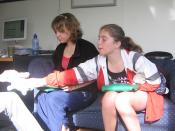POETIC VOICES
The poetic voices in "The Waste Land", the ones who tell us a story about a quest for regenerating a waste land, are multiple in the poem. The principle poetic voice is Tiresias, who is going to appear in the third section, "The Fire Sermon". We are going to focus in one section, "A game of chess" and the two main poetic voices: two women.
FORM
Firstly, before analyzing the poetic voices of the section, we have to divide it into two different parts. The first part of the section is largely in unrhymed iambic pentameter lines, or blank verse. As the section proceeds, the lines become increasingly irregular in length and meter, giving the feeling of disintegration, of things falling apart. As the woman of the first half begins to give voice to her paranoid thoughts, things do fall apart, at least formally: We read lines of dialogue, then a fragment from a nonsense song.
The last four lines of the first half rhyme, although they are irregular in meter, suggesting at least a partial return to stability.
The second half of the section is a dialogue interrupted by the barman's refrain. This part, rather than following an organized structure of rhyme and meter, constitutes a series of phrases connected by "I said(s)" and "she said(s)." This is perhaps the most poetically experimental section of the entire poem, where Eliot is writing in a lower-class vernacular. This section exposes the prevalent claim that iambic pentameter mirrors normal English speech patterns, as line length and stresses are consistently irregular. The section sounds like poetry: the repeated use of "I said" and the grounding provided by the barman's chorus allow the woman's speech to flow elegantly, despite her rough phrasing and the coarse content of her story.


